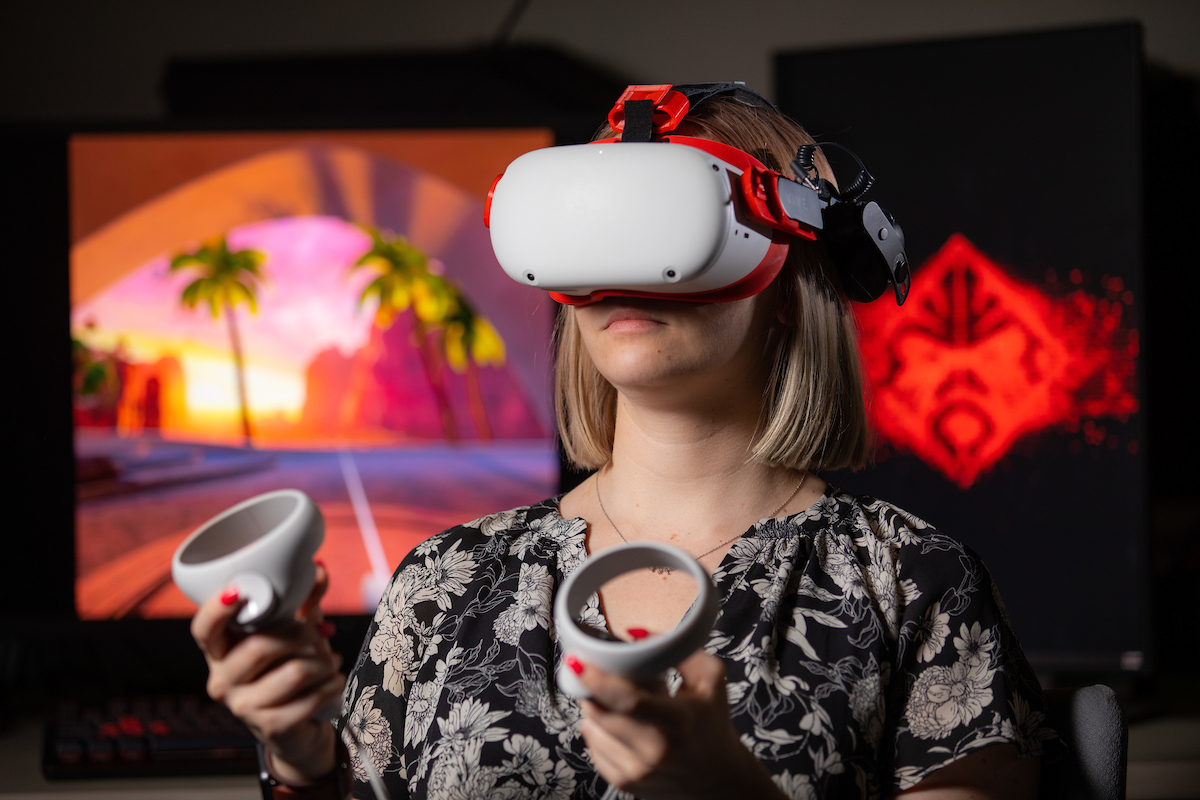Iowa State University students become leaders in civic engagement
Thanks to the hard work of faculty, staff, and students in the Carrie Chapman Catt Center for Women and Politics, Iowa State students outperform their peers nationwide when it comes to voting engagement. In 2020, a whopping 89.3% of Iowa State students were registered to vote, compared to just 59.8% of adults age 18-24 nationwide. And while only 51.4% of 18-24 year-olds in the U.S. voted in 2020, nearly 73% of Iowa State students voted.
The center is celebrating its 30th anniversary and a legacy of educating and mobilizing citizens in the political process. Over the years, the center became a trusted source for education and analysis and recently garnered multiple national awards for engaging students in the voting process. Read more about the center’s accomplishments and explore contributed articles about its history from alumni and friends in VOICES magazine.
New climate science degree in LAS meets student demand
The Iowa Board of Regents approved a new, interdisciplinary climate science degree program that will provide students an opportunity to help address and adapt to global climate change. The degree is offered by the Department of Geological and Atmospheric Sciences, and allows flexibility through six different pathways: advanced climate science; science visualization; design and planning for sustainability; policy and human behavior; climate, food, agriculture, and biodiversity; and science communication.
Researchers working to help Ukrainian refugees find housing, integrate into the Midwest
Iowa State researchers will study which factors determine successful integration of Ukrainian refugees into Midwestern communities. Nell Gabiam, associate professor in the Department of World Languages and Cultures, and Scott Feinstein, assistant professor in the Department of Political Science, are part of this NSF-funded Civic Innovation Challenge project.
Exploring how people adapt to cybersickness from virtual reality
Jonathan Kelly, professor of psychology and human and computer interaction, leads research that will help humans adapt as the uses of virtual reality increases. Initial results from their study indicate cybersickness symptoms from virtual reality improve with just three 20-minute sessions over a week, but a higher percentage of women and people who are prone to motion sickness have a harder time adapting.
Believing in the power of community
Meet Kaleb Nichols (’24 sociology), an innovator, social entrepreneur, and a rising star. He wants to use his future sociology degree to create strong communities for Black youth. With an eye to graduate school in the future, he's already making a considerable impact.
Light pollution disrupting seasonal rhythms, lengthening pollen season in U.S. cities
On the positive side, longer growing seasons could allow urban farms to be active over longer periods of time. Plants could also provide shade to cool neighborhoods earlier in spring and later in fall as global temperatures rise. But changes to the growing season could also increase plants’ vulnerability to spring frost damage. And it can create a mismatch with the timing of other organisms, such as pollinators, that some urban plants rely on.
Yuyu Zhhou, associate professor of environmental science, shares his research findings in The Conversation.
Iowa Insect Pageant celebrates entomology, jazz, and puppetry
The Iowa Insect Pageant is a unique collaboration between the arts and sciences at ISU with original music, giant puppets, and a performance aimed at bringing attention to the fascinating and complex world of insects. The original music was composed by Teaching Professor of Music Mike Giles and performed by the ISU jazzONE ensemble he directs; insect expertise and guidance was provided by entomology professor Matt O’Neal; and Amanda Petefish-Schrag, associate professor of theatre and the show’s playwright, directed a team of puppets and puppeteers. The puppets were made out of discarded materials.
LAS students spend summer developing their entrepreneurial ideas
Four LAS students learned how to take their entrepreneurial endeavors to the next level, during the ISU Papajohn Center for Entrepreneurship's 2022 Cystarters summer session. Miranda Ekern (’22 biochemistry) is pouring herself into Ekern Designs, her drinkware business, during the 11-week session.
Physicists use quantum simulation tools to study, understand exotic states of matter
Physicists have demonstrated how simulations using quantum computing can enable observation of a distinctive state of matter taken out of its normal equilibrium. Thomas Iadecola, assistant professor of physics and astronomy, published the research in the journal Nature. Such novel states of matter could one day lead to developments in fast, powerful quantum information storage and precision measurement science.
New book aims to help people “get unstuck and be happier”
Douglas Gentile, Distinguished Professor in the College of Liberal Arts and Sciences and professor of psychology, weaves psychological science with Buddhist philosophy and anecdotes to help people break negative patterns and engage more fully with the present. Gentile explains in the book that negative patterns often emerge because people choose something that feels more comfortable in the short-term. They ignore, lash out, or run away to make themselves feel better in the moment rather than confront a problem.
